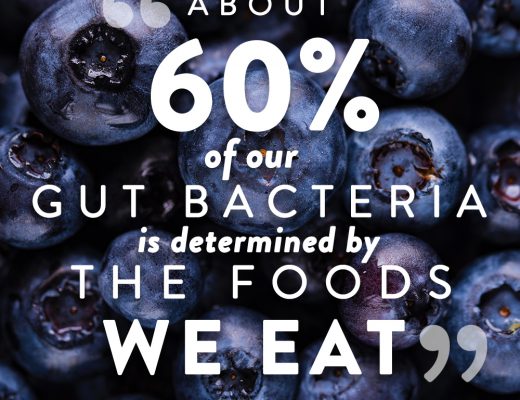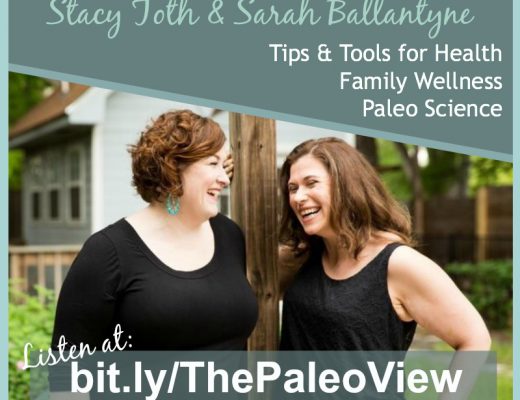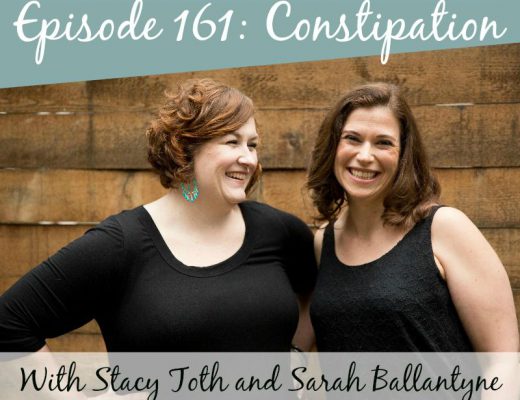[slider]
Our sixtieth show!
Ep. 60: Breastfeeding & Weaning
In this episode, Stacy and Sarah tackle a number of breastfeeding questions from the queue, chat about the safety of kombucha while pregnant and breastfeeding, and share many tips that range from supply increasing to pump session eliminations.
Click the picture above to be taken to iTunes
or download and listen by clicking the PodBean player below
We’re now on Stitcher!
If you enjoy the show, please review it in iTunes!
The Paleo View (TPV), Episode 60: Breastfeeding & Weaning
- 0:00 – Introduction
- 0:52 – News & Views
- Last week’s micronurtrient show was a lot of fun with the Caltons – check it out if you haven’t yet!
- Stacy is getting ready to do Barbells for Boobs, and you can find information here if you want to donate towards this great cause that provides free mammograms for those who can’t afford them
- The Paleo Parents also recently launched a newsletter – subscribe if you haven’t yet!
- Sarah recently posted two amazing recipes – Maple-Walnut Dark Chocolate Chunk Cookies and Bacon-Apple Chicken Burgers with Maple Cranberry Sauce
- Stacy and Sarah have some serious love for cranberries and Stacy recommends that folks check out her pork stuffing recipe from Beyond Bacon, which happens to feature cranberries
- Sarah gives a Happy Thanksgiving shout out to her fellow Canadians
- The Paleo Approach Cookbook is up on Amazon and available for pre-order; the announcement includes five awesome giveaways!
- This week’s show is about boobs, breastfeeding and weaning
- Stacy is a breastfeeding advocate with a wealth of information from being a very active member of La Leche League
- Sarah also has a lot of experience from her years of breastfeeding her daughters, her aunt was also a lactation consultant
- (12:52) Science with Sarah – The Health Benefits of Kombucha
- Most of the health claims about kombucha have little to no evidence to support the claims
- However, since kombucha is a fermented beverage with probiotics there are health benefits from the beneficial yeast and bacteria strains
- You will also get a wide variety of unique strains of good bacterias, which benefit your overall health
- The only metabolite of kombucha that may be of concern to a pregnant woman is the alcohol content, which a serving on average has between 0.5% to 2/3%
- A non-alcoholic beer has 0.5% alcohol, so if you are having half a glass a day you are within your daily safety limits – but you have to make that personal conscious decision on what feels right for you
- As a breastfeeding woman that level of alcohol is considered to be a non-issue because the alcohol content is diluted
- It would take some work to get drunk off of the alcohol content in kombucha, and the trace amount in breastmilk is considered to be safe
- If you are buying your kombucha from stores those are quality controlled and you are not being exposed to bad bacteria
- If you are making your own kombucha it is important to check home-brew resources to understand how a SCOBY would mildew and how to prevent it from happening
- (21:14) Questions & Answers
- Jessica – What are alternative options to formula when one is dealing with low supply?
- Please be sure to listen to previous podcasts where this topic is also discussed: episode 4, episode 33
- Stacy notes that breastfeeding is very personalized and is driven by society and what medical experts can help you with, please be sure to surround yourself with supportive people both in a professional capacity and in your friends and family circles
- Stacy’s common suggestions regarding supply would be stress management, adequate sleep, increased fat consumption, omega 3 rich foods, teas like Mother’s Milk, grain-free lactation cookies
- It sounds like Jessica did all of these things, but it sounds like there was a genuine medical situation in this case that may be impacting her ability to increase supply
- The only medical condition that Stacy is familiar with that impacts milk supply is thyroid conditions, and Stacy suggests looking to Practical Paleo on how to address thyroid issues
- Stacy notes that if your baby has a latch issue that is impacting supply, there are tube systems to help you through the latch challenges
- The Westin A. Price Foundation has some recipes for homemade formula
- From Stacy’s experience, the flavor variations from the homemade recipes are of benefit to how your child develops their eating habits later in life
- Circling back on the thyroid medical concern, Sarah is not sure if a thyroid condition is the only thing that can impact milk supply, but it is a candidate
- If there is a low thyroid function the autoimmune protocol would be a good route to explore
- Sarah recommends pastured egg yolk, grass-fed ghee and lots of seafood (check this post from Sarah on mercury content) for those who are dealing with an autoimmune condition while pregnant
- Stacy reminds Jessica to be proud of all the effort you put in and to remember that you did the very best you could – your child can still lead a healthy life
- Like all things in life, be positive and find what things you can impact, like first foods, etc.
- (38:18) Kelly – how do hormones from breastfeeding impact adult acne? How do the hormones impact menstruation?
- Sugar may be causing the breakouts, which is a common issue that people face, it may help to eliminate sugar first
- Getting your baby enough milk is your biggest priority, so focus your elimination diet priorities so that you still get the abundance of micro and macronutrients that you need to keep your supply strong and rich in nutrients
- Sarah notes that there could be a hormone connection – so many things change during and after pregnancy from the hormone fluctuations, and the hormones could be impacting food sensitivities, the functioning of the immune system and the strength of the gut barrier
- Unfortunately there is not a good way to test what is causing your experiences other than dabbling in elimination dieting
- Stacy has shared on her hormonal changes from weaning and you can find that post here
- (49:40) Heather – what liquids should I provide my baby as I cut back on her breastmilk intake?
- Stacy and Matt replaced breastmilk with water, the kids never received anything other than breastmilk in a bottle
- Eleven months may be a little too young to wean because babies still rely on breastmilk at that age to meet all their nutrient needs
- You could try bone broth in a sippy cup for more nutrients
- In the beginning, Stacy and Matt put a very tiny bit of apple juice in the water to relate the flavor to the sweetness of breastmilk while transitioning them to drink water
- If you are taking breastmilk out of the equation, make sure you are adding things into the baby’s diet that replace the nutrient density of breastmilk (think super foods like organ meats)
- Sarah notes that there is a societal expectation to wean at a year and Sarah encourages Heather to explore extended breastfeeding benefits and baby-led weaning to see if it could work for her family
- Stacy suggested eliminating the at-work pump sessions first, to cut down nursing time to night only so that her baby will still receive the breastmilk benefits
- When Sarah weaned her older daughter they dealt with a challenging case of thrush, whereas her younger daughter gave up breastfeeding without any difficulties – both of Sarah’s kids were over two years old when they weaned
- Jessica – What are alternative options to formula when one is dealing with low supply?
- (1:03:24) The reviews in iTunes are awesome and Stacy and Sarah love them!
- Each individual can only leave one review, so if you go on and leave a new review it replaces your old one
- (1:06:48) Outro





